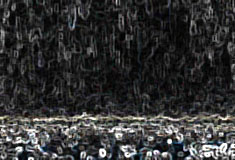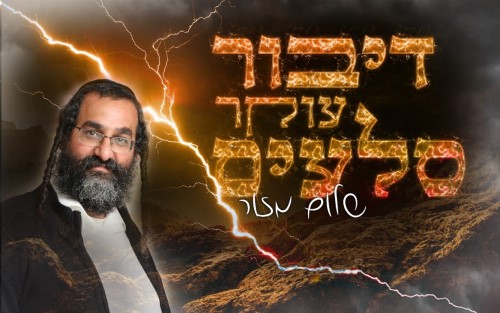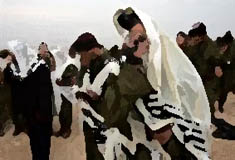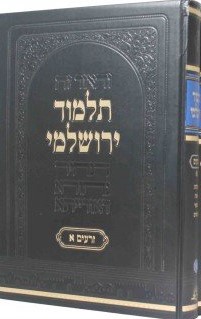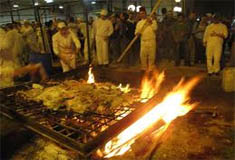Battle of Beliefs: Halachic Insights on Yeshiva and Service
הרב שי טחןיז אדר ב, תשפד27/03/2024A hilchatic guide for Iaresl heated debate- yeshiva and service in the Army
תגיות:גיוס חרדיםלימוד תורהצבא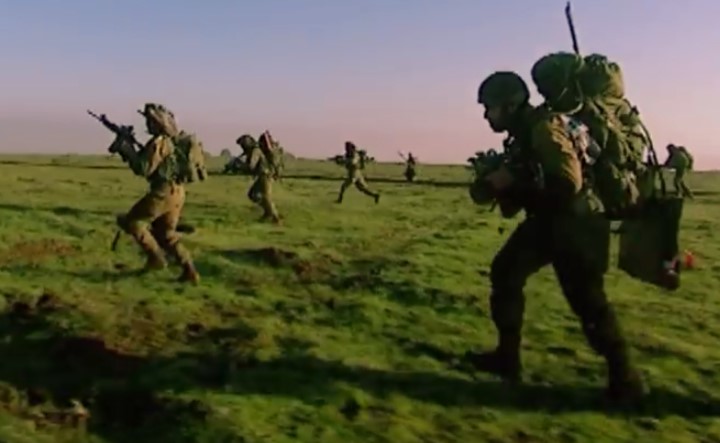
One of the most heated discussions in Israel revolves around the question of drafting yeshiva boys into the army. Yeshiva boys are students of Jewish religious schools where they study religious texts, primarily the Talmud, often for many years.
First Israeli Prime Minister David Ben-Gurion instituted a policy that exempted a small number of yeshiva students from military service. This exemption was part of a broader effort to reach a compromise between the religious community and the state regarding military conscription.
In 1949, Ben-Gurion agreed to exempt a quota of 400 yeshiva students annually from military service. This decision was made in the context of the delicate balance between the new state's secular nature and the demands of the religious community. The agreement was known as the "status quo agreement" and was intended to regulate the relationship between the Israeli government and the religious community.
The rationale behind this exemption was to allow for the continuation of religious studies within the yeshivas while also recognizing the importance of military service for the security of the state. It was seen as a way to accommodate the religious lifestyle of these students while still meeting the needs of the military.
Over time, the number of yeshiva students exempted grew significantly, leading to criticism from various sectors of Israeli society. Critics argue that the exemption has created a situation where a significant portion of the ultra-Orthodox population does not serve in the military or participate in national service, leading to issues of inequality and a perceived lack of contribution to the country's defense.
The "Ben-Gurion exemption" remains a contentious issue in Israeli society, with ongoing debates about the balance between religious freedom, national security, and equal burden-sharing in military service. Various attempts have been made by different Israeli governments to revise the exemption policy, often resulting in political tensions and challenges.
This debate touches upon several key issues in Israeli society.
Firstly, it involves the balance between religious and secular life in Israel. The ultra-Orthodox community, which includes many yeshiva students, has historically been exempt from compulsory military service. This exemption has led to tensions with the secular and other religious Jewish communities who argue that everyone should share the burden of national defense.
Secondly, there are economic considerations. Some argue that integrating yeshiva boys into the military would help reduce the burden on the economy, as the majority of Israelis serve in the military while the ultra-Orthodox community's exemption means they are not contributing to this aspect of national service.
Additionally, there are questions of fairness and equality. Critics of the exemption argue that it creates a disparity between those who serve in the military, often facing significant risks and making personal sacrifices, and those who do not.
This debate is deeply entrenched in Israeli society and has political, social, and religious dimensions. It touches upon core issues of identity, national unity, and the role of religion in the state. As such, discussions around drafting yeshiva boys into the army continue to be one of the most contentious and divisive topics in Israeli public discourse.
We should start by noting the obvious: if there is imminent danger to a Jewish person, community, or city, of course, everyone without exceptions should go and fight the enemy in order to save them. This includes people who are learning, as no one is exempt from the mitzvah of saving a life. This is a Torah mitzvah of "לא תעמוד על דם רעך" - "Do not stand idly by the blood of your neighbor."
Obligations of Torah Students in Times of War.
In this article, we want to examine this exemption from a halachic perspective. On one hand, the fact that the wars being fought are considered "milchemet mitzvah" as the Rambam writes(פרק ה מהל’ מלכים ה״א) : wars fought to assist Israel from an attacking enemy. Such a war is obligatory on everyone, as the Rambam states(פ״ז מהל’ מלכים ה״ד) that in a milchemet mitzvah the entire nation must go out to war, even a groom from his chamber, and a bride from her pavilion. Therefore, the yeshiva boys are not exempt from assisting.
We find that the tribe of Levi went to wars (soon will be explained that torah students are compared to shevet Levi). We see this from the fight of the Hasmoneans, who were Kohanim, against the Greeks. We also learn that a Kohen goes to war from the fact that the Torah does not exempt him, as it does to other newlyweds, if he marries a divorcee against Torah commandments. This demonstrates that he must still fulfill his obligation to fight in wars.
Sources Where Students Do Not Go Out to Fight Wars.
On the other hand, there are a few places where the Rambam exempts Torah students from joining the fighting force. For example, the Rambam writes(פרק יג מהל’ שמיטה ויובל הלכה י״ב) that the tribe of Levi doesn't go to fight wars, and he compares those who dedicate their lives to learning to the tribe of Levi(שם הלכה יג) . Rav Chaim Kanievsky(דרך אמונה שם) writes that from here you learn that the yeshiva students do not go out to fight wars.
Drafting Torah students is so severe that Avraham Avinu was punished, and his children were destined to be enslaved in Egypt because he drafted students for a war(נדרים לב, א ובר״ן) .
There are several reasons to exempt them from fighting. One reason is the belief that those who learn Torah benefit the war effort more than the actual soldiers who are fighting. This is supported by statements from Chazal, such as on the pasuk(במדבר לא, ד) : “A thousand per tribe, a thousand per tribe.” Chazal said(תנחומא מטות סימן ג’) that the repetition in the pasuk teaches that for every thousand fighting soldiers, there are a thousand people who are praying. In another place, Chazal mention a thousand people learning Torah. This underscores the importance of learning at times of war, as we believe that Torah is the key for victory. We learn this from the interaction of the angel who came to rebuke Yehoshua in the war(מגילה ג, א) .
In the passage from Yehoshua (ה, יג- יד), it is written: “When Yehoshua was by Yericho he lifted up his eyes and looked, and behold, a man stood over against him with his sword drawn in his hand. And Yehoshua went over to him and said to him: Are you for us, or for our adversaries? And he answered, No, but I am captain of the host of Hashem, I have come now. And Yehoshua fell on his face to the earth, and bowed down.”
According to the gmara the angel said to Yehoshua: "Yesterday, i.e., during the afternoon, you neglected the afternoon daily offering due to the impending battle, and now, at night, you have neglected Torah study, and I have come to rebuke you." Yehoshua asked him: "For which of these sins have you come?" He said to him: "I have come now (the latter)," indicating that neglecting Torah study is more severe than neglecting to sacrifice the daily offering.
We learn that even on the battlefield, during times when the soldiers rest, they should engage in Torah study. The mefarshim ask why it was necessary to rebuke Yehoshua at this particular time, and they explain that the key to victory is the merit of Torah study. Therefore, it's crucial to encourage Yehoshua to learn at this very moment.
This is how Chazal (מכות י, א)explained the pasuk(תהלים קכב) : "Our feet were standing on the gates of Yerushalayim." What caused our feet to withstand the enemies in war? It is the gates of Jerusalem, where they were engaged in Torah study.
In another Gemara(סנהדרין מט, א) , the reason given for "Yoav was victorious with the army" is because "David executed judgment and justice to all his people." Were it not for David, who studied Torah, Yoav would not have been able to wage war successfully. Rashi explains that the merit of David's learning stood for Yoav at the war to win.
Do the Righteous Fight?
One might question this by considering that scholars did indeed go to wars. This is evident from how Chazal defined those who are exempt from fighting in war; the pasuk says whoever is afraid is exempt, and they explained it means they are afraid of their sins. An example of these sins includes talking at places where one isn't allowed to talk, such as in between wrapping the tefillin of the hand and head. We see that only the very righteous went to fight in wars, those who wouldn't even commit such a small sin as talking at those sacred moments.
There are two ways to explain this. Firstly, of course, those who are righteous go to war, but not necessarily those who were learning Torah all day; rather, it may be those righteous men who were working. Secondly, this opinion does not align with halacha, as halacha(פ״ז מהלכ’ מלכים הלכה טו) sides with the opinion that a person who is afraid means fear of the war itself, for example, from seeing a sword.
Working Out the Contradiction: Torah Students in Times of War.
Let's revisit the contradiction we are dealing with regarding whether the students or the Levites, who are compared to them, should join the army in fighting a war. The simple answer is that there are two types of wars: a mitzvah war, where the Kohanim go out to fight, and a voluntary war where they do not(רד״ק שמואל ב, כג, כ) .
Another answer comes from Rav Chaim Kanievsky(דרך אמונה הל’ שמיטה ויובל בבאור הלכה פרק יג) , who states that Torah students and Shevet Levy are not obligated to fight but may join the fighting if they wish. Therefore, there is no contradiction, as the sources saying they don't fight mean they aren't obligated to do so.
Another approach is from the Netziv(פרשת מטות) , who writes that Torah students didn't engage in the actual fighting of the war but rather served the army by preparing, watching the weapons, and providing other necessary support for the military.
Harav Kook(שבת הארץ ח״ג הל’ שמיטה ויובל פרק יג הי״ב) wrote that for a private war, such as a tribe going to conquer land, Torah students didn't join the fight. However, when it's a war for the nation, everyone is obligated to fight. He even adds that since it's a mitzvah to fight for the nation, therefore the Kohanim were more obligated to fight, as their role as Kohanim obligates them more than others in mitzvot.
First Israeli Prime Minister David Ben-Gurion instituted a policy that exempted a small number of yeshiva students from military service. This exemption was part of a broader effort to reach a compromise between the religious community and the state regarding military conscription.
In 1949, Ben-Gurion agreed to exempt a quota of 400 yeshiva students annually from military service. This decision was made in the context of the delicate balance between the new state's secular nature and the demands of the religious community. The agreement was known as the "status quo agreement" and was intended to regulate the relationship between the Israeli government and the religious community.
The rationale behind this exemption was to allow for the continuation of religious studies within the yeshivas while also recognizing the importance of military service for the security of the state. It was seen as a way to accommodate the religious lifestyle of these students while still meeting the needs of the military.
Over time, the number of yeshiva students exempted grew significantly, leading to criticism from various sectors of Israeli society. Critics argue that the exemption has created a situation where a significant portion of the ultra-Orthodox population does not serve in the military or participate in national service, leading to issues of inequality and a perceived lack of contribution to the country's defense.
The "Ben-Gurion exemption" remains a contentious issue in Israeli society, with ongoing debates about the balance between religious freedom, national security, and equal burden-sharing in military service. Various attempts have been made by different Israeli governments to revise the exemption policy, often resulting in political tensions and challenges.
This debate touches upon several key issues in Israeli society.
Firstly, it involves the balance between religious and secular life in Israel. The ultra-Orthodox community, which includes many yeshiva students, has historically been exempt from compulsory military service. This exemption has led to tensions with the secular and other religious Jewish communities who argue that everyone should share the burden of national defense.
Secondly, there are economic considerations. Some argue that integrating yeshiva boys into the military would help reduce the burden on the economy, as the majority of Israelis serve in the military while the ultra-Orthodox community's exemption means they are not contributing to this aspect of national service.
Additionally, there are questions of fairness and equality. Critics of the exemption argue that it creates a disparity between those who serve in the military, often facing significant risks and making personal sacrifices, and those who do not.
This debate is deeply entrenched in Israeli society and has political, social, and religious dimensions. It touches upon core issues of identity, national unity, and the role of religion in the state. As such, discussions around drafting yeshiva boys into the army continue to be one of the most contentious and divisive topics in Israeli public discourse.
We should start by noting the obvious: if there is imminent danger to a Jewish person, community, or city, of course, everyone without exceptions should go and fight the enemy in order to save them. This includes people who are learning, as no one is exempt from the mitzvah of saving a life. This is a Torah mitzvah of "לא תעמוד על דם רעך" - "Do not stand idly by the blood of your neighbor."
Obligations of Torah Students in Times of War.
In this article, we want to examine this exemption from a halachic perspective. On one hand, the fact that the wars being fought are considered "milchemet mitzvah" as the Rambam writes(פרק ה מהל’ מלכים ה״א) : wars fought to assist Israel from an attacking enemy. Such a war is obligatory on everyone, as the Rambam states(פ״ז מהל’ מלכים ה״ד) that in a milchemet mitzvah the entire nation must go out to war, even a groom from his chamber, and a bride from her pavilion. Therefore, the yeshiva boys are not exempt from assisting.
We find that the tribe of Levi went to wars (soon will be explained that torah students are compared to shevet Levi). We see this from the fight of the Hasmoneans, who were Kohanim, against the Greeks. We also learn that a Kohen goes to war from the fact that the Torah does not exempt him, as it does to other newlyweds, if he marries a divorcee against Torah commandments. This demonstrates that he must still fulfill his obligation to fight in wars.
Sources Where Students Do Not Go Out to Fight Wars.
On the other hand, there are a few places where the Rambam exempts Torah students from joining the fighting force. For example, the Rambam writes(פרק יג מהל’ שמיטה ויובל הלכה י״ב) that the tribe of Levi doesn't go to fight wars, and he compares those who dedicate their lives to learning to the tribe of Levi(שם הלכה יג) . Rav Chaim Kanievsky(דרך אמונה שם) writes that from here you learn that the yeshiva students do not go out to fight wars.
Drafting Torah students is so severe that Avraham Avinu was punished, and his children were destined to be enslaved in Egypt because he drafted students for a war(נדרים לב, א ובר״ן) .
There are several reasons to exempt them from fighting. One reason is the belief that those who learn Torah benefit the war effort more than the actual soldiers who are fighting. This is supported by statements from Chazal, such as on the pasuk(במדבר לא, ד) : “A thousand per tribe, a thousand per tribe.” Chazal said(תנחומא מטות סימן ג’) that the repetition in the pasuk teaches that for every thousand fighting soldiers, there are a thousand people who are praying. In another place, Chazal mention a thousand people learning Torah. This underscores the importance of learning at times of war, as we believe that Torah is the key for victory. We learn this from the interaction of the angel who came to rebuke Yehoshua in the war(מגילה ג, א) .
In the passage from Yehoshua (ה, יג- יד), it is written: “When Yehoshua was by Yericho he lifted up his eyes and looked, and behold, a man stood over against him with his sword drawn in his hand. And Yehoshua went over to him and said to him: Are you for us, or for our adversaries? And he answered, No, but I am captain of the host of Hashem, I have come now. And Yehoshua fell on his face to the earth, and bowed down.”
According to the gmara the angel said to Yehoshua: "Yesterday, i.e., during the afternoon, you neglected the afternoon daily offering due to the impending battle, and now, at night, you have neglected Torah study, and I have come to rebuke you." Yehoshua asked him: "For which of these sins have you come?" He said to him: "I have come now (the latter)," indicating that neglecting Torah study is more severe than neglecting to sacrifice the daily offering.
We learn that even on the battlefield, during times when the soldiers rest, they should engage in Torah study. The mefarshim ask why it was necessary to rebuke Yehoshua at this particular time, and they explain that the key to victory is the merit of Torah study. Therefore, it's crucial to encourage Yehoshua to learn at this very moment.
This is how Chazal (מכות י, א)explained the pasuk(תהלים קכב) : "Our feet were standing on the gates of Yerushalayim." What caused our feet to withstand the enemies in war? It is the gates of Jerusalem, where they were engaged in Torah study.
In another Gemara(סנהדרין מט, א) , the reason given for "Yoav was victorious with the army" is because "David executed judgment and justice to all his people." Were it not for David, who studied Torah, Yoav would not have been able to wage war successfully. Rashi explains that the merit of David's learning stood for Yoav at the war to win.
Do the Righteous Fight?
One might question this by considering that scholars did indeed go to wars. This is evident from how Chazal defined those who are exempt from fighting in war; the pasuk says whoever is afraid is exempt, and they explained it means they are afraid of their sins. An example of these sins includes talking at places where one isn't allowed to talk, such as in between wrapping the tefillin of the hand and head. We see that only the very righteous went to fight in wars, those who wouldn't even commit such a small sin as talking at those sacred moments.
There are two ways to explain this. Firstly, of course, those who are righteous go to war, but not necessarily those who were learning Torah all day; rather, it may be those righteous men who were working. Secondly, this opinion does not align with halacha, as halacha(פ״ז מהלכ’ מלכים הלכה טו) sides with the opinion that a person who is afraid means fear of the war itself, for example, from seeing a sword.
Working Out the Contradiction: Torah Students in Times of War.
Let's revisit the contradiction we are dealing with regarding whether the students or the Levites, who are compared to them, should join the army in fighting a war. The simple answer is that there are two types of wars: a mitzvah war, where the Kohanim go out to fight, and a voluntary war where they do not(רד״ק שמואל ב, כג, כ) .
Another answer comes from Rav Chaim Kanievsky(דרך אמונה הל’ שמיטה ויובל בבאור הלכה פרק יג) , who states that Torah students and Shevet Levy are not obligated to fight but may join the fighting if they wish. Therefore, there is no contradiction, as the sources saying they don't fight mean they aren't obligated to do so.
Another approach is from the Netziv(פרשת מטות) , who writes that Torah students didn't engage in the actual fighting of the war but rather served the army by preparing, watching the weapons, and providing other necessary support for the military.
Harav Kook(שבת הארץ ח״ג הל’ שמיטה ויובל פרק יג הי״ב) wrote that for a private war, such as a tribe going to conquer land, Torah students didn't join the fight. However, when it's a war for the nation, everyone is obligated to fight. He even adds that since it's a mitzvah to fight for the nation, therefore the Kohanim were more obligated to fight, as their role as Kohanim obligates them more than others in mitzvot.
הוסף תגובה

עוד מהרב שי טחן
עוד בנושא פוליטיקה



